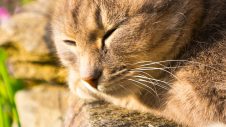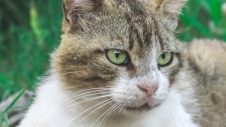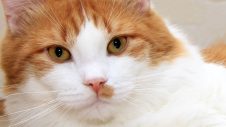What is Cardiomyopathy?
Cardiomyopathy is a disease of the heart muscle. It occurs in both dogs and cats and there are a number of different types.
Types and cause of Cardiomyopathy
There are a number of specific types of cardiomyopathy that occur in dogs and cats and therefore there are a number of causes as well. Below is an outline of the types and their causes.
Dogs
Dilated cardiomyopathy (DCM)
Dilated cardiomyopathy (DCM) is by far the most common type of cardiomyopathy that occurs in dogs. It involves a weakening of the heart muscle, an increase in the size of the heart chambers, and a decrease in the heart’s ability to pump blood around the body.
The exact cause of DCM is not yet fully understood. It is thought that genetics may have a role to play, however, as some breeds of dogs like Dobermans, Boxers, and Cocker Spaniels, are more likely to suffer from it than others. Certain drugs like chemotherapy drugs and toxins found in particular types of plants have also been linked with the disease. Most dogs that develop DCM are large breed dogs, although smaller breeds can also be affected. The following symptoms may be seen in dogs suffering from DCM:
- lethargy
- breathing difficulty
- coughing
- appetite loss
- ascites (a stomach full of fluid)
- collapsing
X-rays and an ultrasound of the heart are needed to diagnose DCM. Treatments are varied depending on the severity of the condition. In most cases, a drug will be given to your pet to make their heart beat stronger, and a second drug will be given to control fluid build-up in the lungs.
Hypertrophic cardiomyopathy (HCM)
This is a rare type of cardiomyopathy that occurs in dogs. The cause is unknown – however, a genetic basis is suspected. In HCM, the muscle wall of the heart thickens. This makes the heart chambers smaller than normal, meaning less blood can be pumped around the body. Symptoms of HCM are similar to that of DCM, and again diagnosis is made using X-rays and a heart ultrasound. Treatment of HCM involves the use of drugs that slow down the contraction of the heart and therefore allow the chambers to be filled with more blood to be pumped around the body.
Cats
Hypertrophic cardiomyopathy (HCM)
This type of cardiomyopathy is by far the most common in cats. In cats with HCM, the heart muscle becomes thicker. Hyperthyroidism – a disease where a tumour develops on the thyroid gland and causes the release of an excessive amount of thyroid hormone – is the most common condition that leads to cats developing HCM. This excessive amount of hormone is responsible for the speeding up of the cat’s metabolism, which includes the speeding up of heart rate. As the heart is pumping more quickly, its muscle starts to thicken up.
HCM in cats is diagnosed using X-rays and an ultrasound of the heart. The symptoms of HCM in cats are varied. Some cats can have the disease but show no symptoms for years. Others that have signs of the disease will often experience:
- breathing difficulty
- lethargy
- appetite loss
Treatment of HCM is similar to what is used in dogs. Drugs are used to slow the heart down, also to decrease the strength of the heart contractions. If hyperthyroidism is the underlying cause then it can be treated and the heart will usually go back to normal.
Dilated cardiomyopathy (DCM)
This is an uncommon type of cardiomyopathy in cats. It occurs when there is a thinning and weakening of the heart muscle walls as well as an increase in the size of the heart chambers. It has a number of causes. The main cause is due to the lack of the amino acid taurine in the diet. Before 1980, this amino acid was absent in a lot of canned and dry cat foods. However today, most good quality foods will have sufficient taurine levels present. Other causes of DCM in cats include damage to the heart muscle due to toxins and infection. Symptoms of DCM are similar to that found in other types of heart disease in cats. They include difficulty breathing, lethargy, not eating, or signs of acute collapsing if severe. Diagnosis is made again using chest x-rays and an ultrasound of the heart. Treatment of DCM in cats is similar to what is done in dogs and involves the use of drugs that help the heart beat stronger as well as drugs that eliminate fluid that may accumulate in the chest.
Restrictive cardiomyopathy (RCM)
This is a rare type of cardiomyopathy that occurs in cats. Its definitive cause is unknown, but one known reason is damage to the heart muscle due to infection or blood clots. In RCM the muscle wall becomes full of scar tissue. It has some similarities with both hypertrophic and dilated cardiomyopathy, so treatments are similar, but proper diagnosis is essential.
Cardiomyopathy must be diagnosed and treated by a veterinary professional. If your pet is displaying symptoms of ill-health at any time, bring them to your local Greencross Vets for diagnosis.

 Greencross Vets
Greencross Vets 










